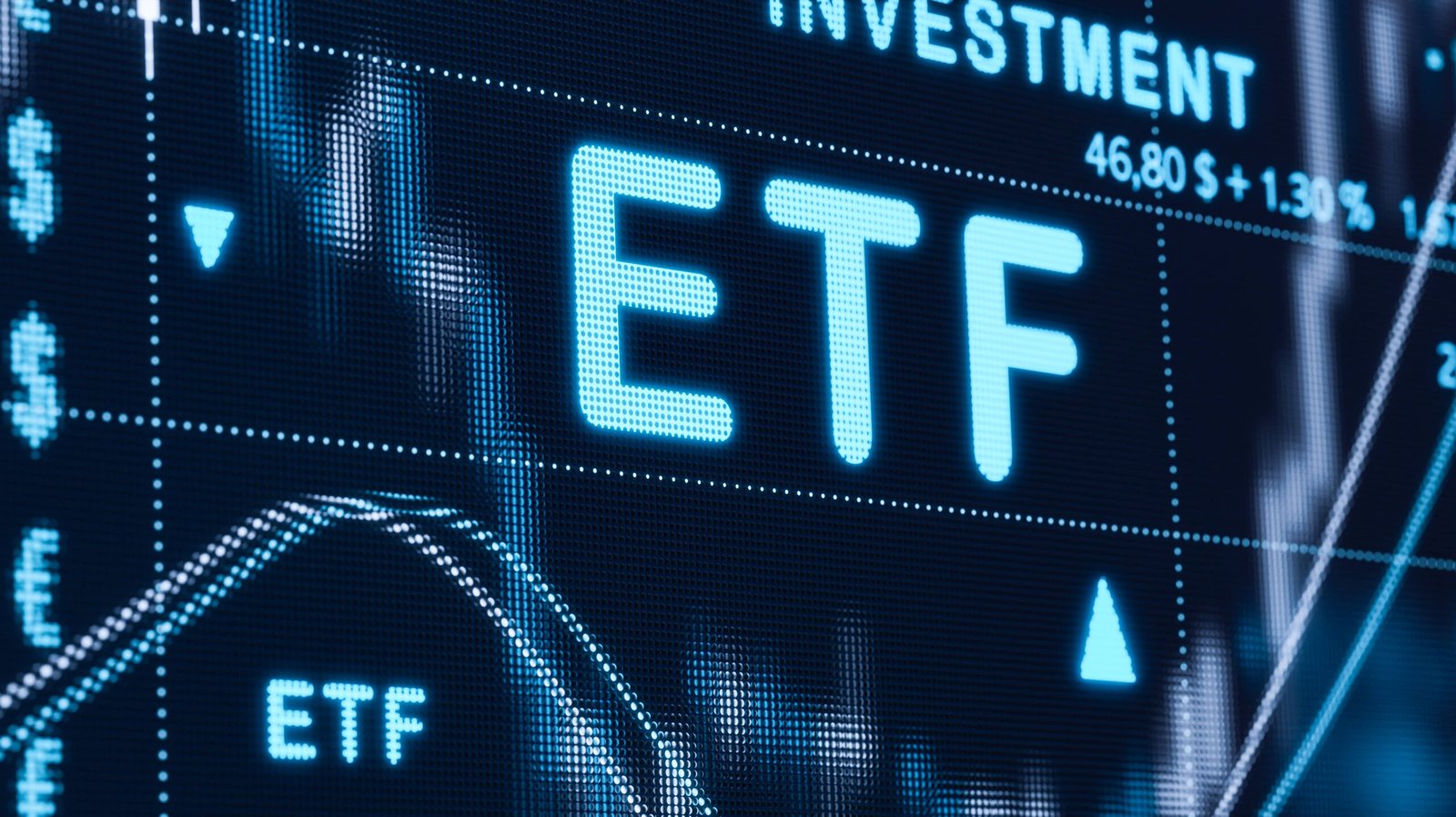The revolutionary world of blockchain technology has opened unprecedented opportunities for investors seeking exposure to digital assets without directly purchasing cryptocurrencies. Blockchain ETF investment options have emerged as sophisticated financial instruments that allow both institutional and retail investors to participate in the growing digital economy through traditional brokerage accounts.
These innovative exchange-traded funds provide diversified exposure to companies developing blockchain technology, cryptocurrency mining operations, and digital payment systems. Understanding the various blockchain ETF investment options available in today’s market is crucial for making informed investment decisions that align with your portfolio objectives and risk tolerance.
What Are Blockchain ETFs and How Do They Work
Blockchain Exchange-Traded Funds represent a revolutionary approach to investing in the digital asset ecosystem without directly holding cryptocurrencies. These funds typically invest in publicly traded companies that derive significant revenue from blockchain technology development, cryptocurrency mining, digital payment processing, or related services.
Unlike traditional mutual funds, blockchain ETFs trade on major stock exchanges throughout market hours, providing liquidity and transparency that appeals to modern investors. The underlying holdings usually include technology companies, financial institutions, and specialized firms that are positioned to benefit from the widespread adoption of blockchain technology.
Most blockchain ETFs follow passive investment strategies, tracking specific indices that measure the performance of blockchain-related companies. This approach helps reduce management fees while providing broad exposure to the rapidly evolving digital asset sector.
Key Components of Blockchain ETF Portfolios
The typical blockchain ETF portfolio includes several categories of companies:
Technology Giants: Large-cap technology companies like NVIDIA, Microsoft, and IBM that provide infrastructure and services supporting blockchain networks.
Financial Services: Traditional banks and fintech companies embracing digital currencies and blockchain-based payment systems.
Cryptocurrency Mining Companies: Specialized firms that operate mining operations for Bitcoin and other digital currencies.
Blockchain Software Developers: Companies creating platforms, applications, and services built on blockchain technology.
Digital Payment Processors: Firms facilitating cryptocurrency transactions and digital wallet services.
Top Blockchain ETF Investment Options in 2025

Amplify Transformational Data Sharing ETF (BLOK)
The Amplify Transformational Data Sharing ETF stands as one of the most established blockchain ETF investment options available to investors. BLOK focuses on companies actively involved in developing and utilizing blockchain technology across various industries.
This fund maintains a diversified portfolio that includes cryptocurrency miners, technology companies, and financial institutions. The expense ratio typically ranges between 0.70% and 0.75%, which is reasonable considering the specialized nature of the underlying assets.
BLOK’s investment strategy emphasizes companies that generate at least 20% of their revenue from blockchain-related activities, ensuring meaningful exposure to the sector’s growth potential. The fund’s holdings are regularly reviewed and adjusted to maintain alignment with emerging blockchain trends.
First Trust Indxx Innovative Transaction & Process ETF (LEGR)
LEGR represents another compelling choice among blockchain ETF investment options, focusing on companies that utilize blockchain technology to enhance business processes and transaction efficiency. This fund takes a broader approach, including traditional companies that have successfully integrated blockchain solutions into their operations.
The ETF’s portfolio encompasses companies from various sectors, including supply chain management, healthcare, real estate, and financial services. This diversification helps reduce sector-specific risks while maintaining exposure to blockchain technology’s transformative potential. With an expense ratio typically below 0.65%, LEGR offers cost-effective access to blockchain innovation beyond pure-play cryptocurrency companies.
VanEck Digital Transformation ETF (DAPP)
The VanEck Digital Transformation ETF provides exposure to companies involved in digital asset ecosystems and blockchain technology development. DAPP’s investment approach focuses on firms that could benefit from the mainstream adoption of digital assets and decentralized applications.
This fund includes holdings in cryptocurrency exchanges, blockchain infrastructure companies, and firms developing decentralized finance (DeFi) applications. The portfolio strategy aims to capture growth opportunities across the entire digital asset value chain. DAPP’s active management approach allows for tactical adjustments based on market conditions and emerging opportunities within the blockchain sector.
Comparing Blockchain ETF Performance and Fees
Expense Ratio Analysis
When evaluating blockchain ETF investment options, expense ratios play a crucial role in long-term returns. Most blockchain ETFs charge higher fees compared to traditional index funds due to their specialized nature and active management requirements.
Typical expense ratios range from 0.65% to 0.95%, with some specialized funds charging premium fees for unique investment strategies or active management. Investors should carefully consider these costs against expected returns and investment objectives. Lower-cost options often provide broader market exposure through passive index tracking, while higher-fee funds may offer specialized strategies or active portfolio management that could justify additional expenses.
Historical Performance Considerations
Blockchain ETFs have experienced significant volatility since their inception, reflecting the dynamic nature of the underlying cryptocurrency and technology markets. Performance has generally correlated with broader cryptocurrency market cycles, showing strong gains during bull markets and substantial declines during bear market periods.
Long-term investors should expect continued volatility while potentially benefiting from the sector’s growth as blockchain technology achieves wider adoption across industries. Past performance patterns suggest that blockchain ETFs may be suitable for investors with higher risk tolerance and longer investment horizons. Diversification within blockchain ETF portfolios has helped mitigate some volatility compared to direct cryptocurrency investments, though these funds remain more volatile than traditional equity ETFs.
Risk Factors in Blockchain ETF Investments
Market Volatility and Cryptocurrency Correlation
Blockchain ETF investment options carry inherent risks related to their exposure to cryptocurrency markets and emerging technology sectors. These funds often experience higher volatility than traditional equity investments due to their correlation with digital asset price movements.
Regulatory changes affecting cryptocurrency markets can significantly impact blockchain ETF performance, as portfolio companies may face operational challenges or reduced demand for their services. Investors should carefully consider their risk tolerance before allocating significant portions of their portfolios to blockchain ETFs. Market sentiment toward cryptocurrencies and blockchain technology can create rapid price swings that affect ETF valuations, sometimes disconnected from underlying company fundamentals.
Regulatory and Technology Risks
The blockchain industry faces ongoing regulatory uncertainty that could impact the business operations of ETF holdings. Changes in government policies regarding cryptocurrency trading, mining, or blockchain applications could affect company revenues and stock prices.
Technology risks include the potential for competing blockchain platforms to emerge, rendering current solutions obsolete, or security vulnerabilities that could damage investor confidence in blockchain technology. Competition from central bank digital currencies (CBDCs) and traditional financial institutions could also impact the growth prospects of blockchain-focused companies.
Concentration and Liquidity Concerns
Some blockchain ETFs may have concentrated holdings in a limited number of companies or geographic regions, increasing portfolio risk. Investors should review fund holdings to understand concentration levels and ensure alignment with their diversification objectives.
Liquidity risks may arise during market stress periods when trading volumes decline, potentially affecting the ability to buy or sell ETF shares at fair prices. This concern is particularly relevant for smaller or newer blockchain ETFs with limited assets under management.
Investment Strategies for Blockchain ETFs

Dollar-Cost Averaging Approach
Given the volatile nature of blockchain ETF investment options, dollar-cost averaging can be an effective strategy for building positions over time. This approach involves making regular, fixed-dollar investments regardless of current market prices, helping to smooth out volatility and reduce the impact of market timing decisions.
Dollar-cost averaging is particularly suitable for blockchain ETFs because it allows investors to benefit from both market downturns and uptrends while maintaining consistent exposure to the sector’s long-term growth potential. This strategy requires discipline and a long-term investment horizon but can help reduce the emotional stress associated with volatile markets.
Portfolio Allocation Considerations
Financial advisors typically recommend limiting blockchain ETF exposure to 5-10% of total portfolio allocation due to the sector’s volatility and emerging nature. This allocation allows investors to participate in potential growth while maintaining overall portfolio stability.
Conservative investors might prefer lower allocations (2-5%), while those with higher risk tolerance and stronger conviction in blockchain technology might allocate up to 15% of their portfolios to these investments. Regular rebalancing helps maintain target allocations as blockchain ETF values fluctuate relative to other portfolio components.
Timing and Market Cycle Considerations
Understanding cryptocurrency market cycles can inform blockchain ETF investment timing, though predicting exact market movements remains challenging. Historical patterns suggest that blockchain-related investments perform well during technology adoption phases and cryptocurrency bull markets.
Long-term investors should focus on fundamental blockchain technology adoption trends rather than short-term market movements. Key indicators include institutional cryptocurrency adoption, regulatory clarity improvements, and mainstream blockchain application development. Tactical investors might consider market sentiment indicators, such as cryptocurrency fear and greed indices, to inform entry and exit decisions.
How to Choose the Right Blockchain ETF for Your Portfolio
Evaluating Fund Holdings and Strategy
When selecting among blockchain ETF investment options, investors should carefully analyze fund holdings to understand exposure levels to different blockchain sectors. Some funds focus heavily on cryptocurrency mining companies, while others emphasize blockchain technology development or financial services applications.
Review the percentage of assets allocated to top holdings and geographic diversification to ensure alignment with your investment objectives and risk tolerance. Funds with more concentrated positions may offer higher growth potential but also increased risk. Consider whether the fund’s investment strategy matches your beliefs about which aspects of blockchain technology will drive future growth and adoption.
Assessing Management Quality and Track Record
Evaluate the fund management team’s experience in technology investing and understanding of blockchain markets. Experienced managers with strong track records in emerging technology sectors may be better positioned to navigate the complex blockchain investment landscape.
Review the fund’s historical performance during different market conditions, paying attention to how well managers have adapted to changing market dynamics and regulatory developments. Active management may justify higher fees if managers demonstrate superior stock selection and risk management capabilities compared to passive index alternatives.
Also Read: Best Long Term Altcoin Investments Top Crypto Picks for 2025
Understanding Fee Structures and Total Cost of Ownership
Compare expense ratios among similar blockchain ETFs, but also consider other costs such as bid-ask spreads and potential premium/discount to net asset value. Lower-cost funds may provide better long-term returns if performance is comparable.
Evaluate whether active management features and specialized investment strategies justify higher fees compared to broader technology or innovation ETFs that include blockchain exposure. Consider the total cost of ownership, including brokerage fees, tax implications, and opportunity costs of higher expense ratios over extended holding periods.
Future Outlook for Blockchain ETF Investment Options

Emerging Trends and Opportunities
The blockchain ETF landscape continues evolving as new use cases emerge and technology adoption accelerates. Future blockchain ETF investment options may include more specialized funds focusing on specific blockchain applications such as supply chain management, healthcare data security, or decentralized finance protocols.
Integration of artificial intelligence with blockchain technology presents new investment opportunities that may be reflected in future ETF offerings. Smart contract platforms and Web3 applications represent growing sectors that could attract dedicated ETF products.
Environmental, social, and governance (ESG) considerations are increasingly important, with potential for ESG-focused blockchain ETFs that emphasize sustainable mining operations and socially beneficial blockchain applications.
Regulatory Development Impact
Clearer regulatory frameworks for cryptocurrency and blockchain technology could reduce investment risks and attract more institutional capital to blockchain ETFs. Positive regulatory developments typically correlate with improved performance for blockchain-focused investments.
Central bank digital currency implementations worldwide may create new opportunities for blockchain infrastructure companies represented in ETF portfolios. However, CBDCs could also compete with private cryptocurrency projects. International regulatory coordination efforts may provide more stable operating environments for blockchain companies, potentially reducing volatility in blockchain ETF performance.
Technology Evolution and Market Maturation
As blockchain technology matures, blockchain ETF investment options may become less volatile and more suitable for conservative investors. Mainstream adoption of blockchain applications could transform these funds from speculative investments to core technology holdings.
Scalability improvements and energy efficiency developments in blockchain networks may attract broader institutional investment, supporting long-term growth for blockchain ETFs. Integration with traditional financial systems and widespread enterprise adoption could establish blockchain ETFs as permanent components of diversified technology portfolios.
Tax Implications and Considerations
Capital Gains and Dividend Treatment
Blockchain ETFs generate taxable events through capital gains distributions and dividend payments from underlying holdings. Understanding the tax implications helps investors make informed decisions about holding periods and portfolio allocation.
Most blockchain ETF dividends qualify for favorable tax treatment, though the specific tax consequences depend on individual circumstances and holding periods. Consult with tax professionals to understand personal tax implications. Tax-advantaged accounts like IRAs and 401(k)s can provide tax-deferred growth for blockchain ETF investments, making them attractive vehicles for long-term blockchain exposure.
Tax-Loss Harvesting Opportunities
The volatility of blockchain ETFs creates opportunities for tax-loss harvesting, where investors realize losses to offset capital gains from other investments. This strategy can improve after-tax returns while maintaining blockchain sector exposure.
Careful attention to wash sale rules is necessary when implementing tax-loss harvesting strategies with blockchain ETFs, particularly when switching between similar funds. Professional tax advice is recommended when implementing sophisticated tax strategies involving volatile investments like blockchain ETFs.
Building a Diversified Blockchain Investment Portfolio
Combining Different Blockchain ETF Strategies
Sophisticated investors might combine multiple blockchain ETF investment options to achieve broader diversification across different aspects of the blockchain ecosystem. This approach could include funds focusing on cryptocurrency mining, blockchain technology development, and digital payment processing.
Geographic diversification through international blockchain ETFs can provide exposure to different regulatory environments and regional adoption patterns. This strategy helps reduce dependence on any single market or regulatory jurisdiction. Combining actively managed and passively managed blockchain ETFs may provide both systematic exposure and opportunistic positioning based on market conditions.
Integration with Traditional Technology Investments
Blockchain ETFs can complement traditional technology investments by providing exposure to emerging digital technologies that may not be well-represented in standard technology ETFs. This integration approach maintains technology sector exposure while adding blockchain-specific opportunities.
Consider how blockchain ETF holdings overlap with existing technology investments to avoid unintended concentration in specific companies or sub-sectors. Some large technology companies appear in both blockchain ETFs and traditional technology funds. Regular portfolio review ensures that blockchain ETF additions enhance overall diversification rather than creating unintended risks or redundant exposures.
Conclusion
The landscape of blockchain ETF investment options offers sophisticated investors unprecedented opportunities to participate in the digital asset revolution through traditional investment vehicles. As blockchain technology continues transforming industries from finance to supply chain management, these ETFs provide diversified exposure to companies positioned to benefit from widespread blockchain adoption.
Success with blockchain ETF investments requires careful consideration of risk tolerance, investment objectives, and portfolio allocation strategies. The volatility inherent in this emerging sector demands a long-term perspective and disciplined approach to position sizing and rebalancing.
Whether you’re a conservative investor seeking modest exposure to blockchain technology or an aggressive growth investor looking to capitalize on digital transformation trends, the expanding universe of blockchain ETF investment options provides vehicles suitable for various investment strategies and risk profiles.

